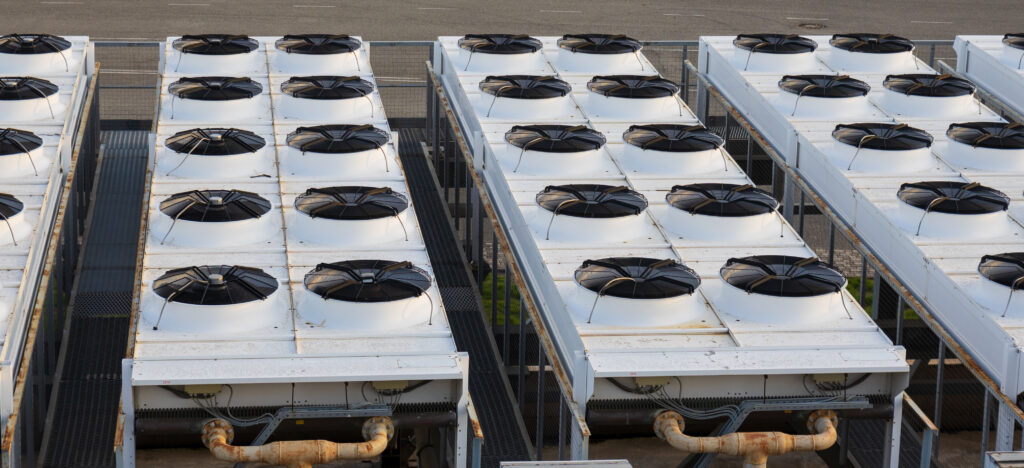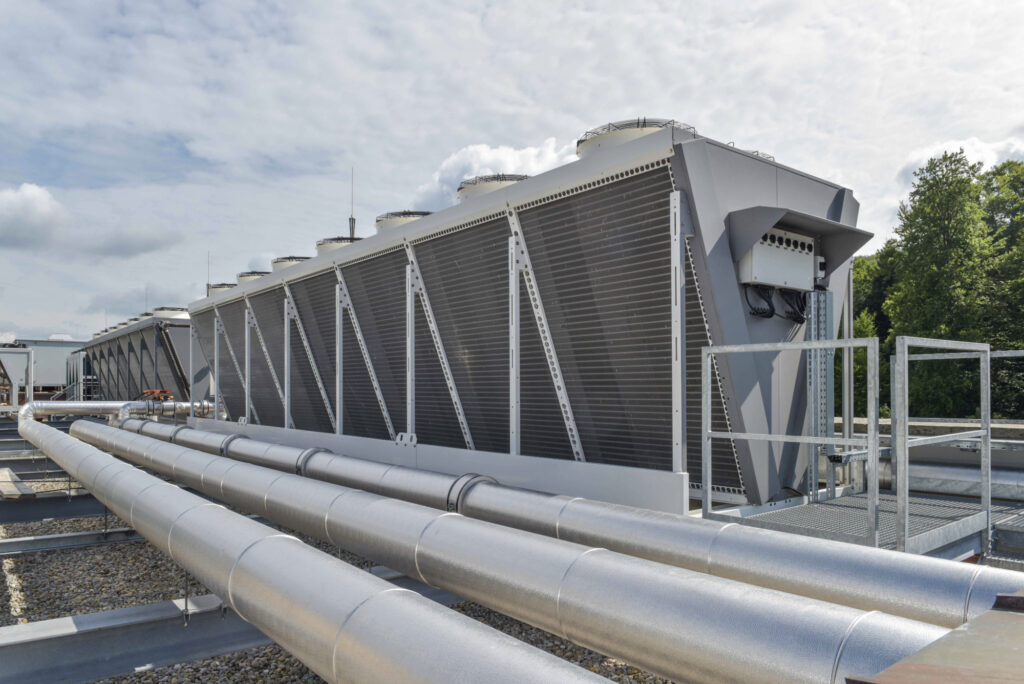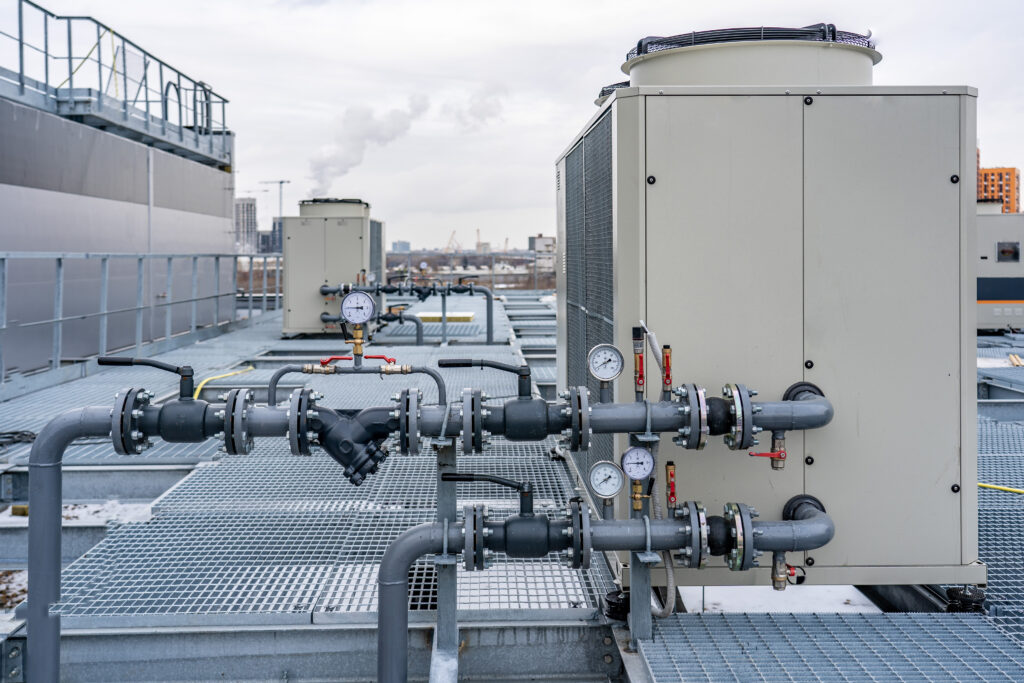Rising summer temperatures push commercial and industrial cooling systems to their limits. As HVAC units work harder to meet demand, HVAC efficiency drops, energy costs soar, and critical equipment faces the risk of failure. Pre-cooling for HVAC systems offers a game-changing solution—reducing strain on air-cooled condensers, heat exchangers, and chillers while significantly improving overall cooling performance.
From power plants and manufacturing facilities to data centers and warehouses, industries rely on efficient cooling to maintain operations. When high ambient temperatures weaken performance, pre-cooling lowers intake air temperatures before it reaches key components. This not only enhances HVAC system efficiency but also reduces energy consumption, extends equipment lifespan, and helps prevent costly breakdowns.
Integrating an advanced pre-cooling system optimizes HVAC performance, keeping industrial and commercial spaces cool, stable, and cost-effective—even in extreme heat.
The Hidden Cost Of HVAC Problems
Your commercial air conditioner system may not be underperforming—it could be overworking. Excess heat around condenser coils forces the system to draw more power, driving up energy costs and increasing the likelihood of HVAC problems. As HVAC system efficiency declines, temperature-sensitive equipment, products, and work environments begin to suffer.
In industrial settings, overheating can disrupt operations, damage critical machinery, and lead to costly downtime. Pre-cooling for HVAC systems helps reduce this strain, enhancing performance while lowering energy consumption and reducing maintenance costs.
Using Pre-Cooling Systems For HVAC Efficiency
Cooling capacity is directly influenced by the temperature of the air surrounding condenser coils. When intake air is too warm, the system struggles to release heat, forcing it to work harder and reducing overall performance. Pre-cooling lowers air temperatures before they reach the coils, enhancing heat transfer and improving HVAC efficiency.
For older or overworked condensers, pre-cooling acts as a revitalizing upgrade—restoring lost efficiency, reducing wear, and extending equipment life. By reducing thermal strain, pre-cooling boosts cooling capacity, allowing HVAC systems to maintain peak performance while using less energy and helping prevent common HVAC problems.
Key Benefits Of Pre-Cooling Condenser Coils
1: Increase HVAC System Efficiency
Pre-cooling the air around the coils lowers the temperature of the surrounding environment, reducing strain on the system. This allows the HVAC system to operate more efficiently, lowering maintenance requirements and extending the lifespan of key components. Enhanced performance means reduced energy consumption—without compromising cooling power.
2: Reduce Energy Costs
An energy-efficient HVAC system directly contributes to lower operational costs. Pre-cooling solutions activate automatically in response to outdoor temperatures, ensuring optimal cooling while minimizing energy waste. This smart approach reduces the workload on HVAC units, resulting in meaningful cost savings over time.
3: Prevent HVAC Problems and Breakdowns
Overworked systems are more likely to overheat, leading to malfunctions and costly repairs. Pre-cooling reduces thermal stress on the condenser, helping the HVAC system maintain stable operating temperatures. This improves reliability, reduces the risk of HVAC problems, and minimizes unplanned downtime.
4: Improve Indoor Climate Control
Enhanced HVAC efficiency enables better indoor temperature regulation—which is essential for industries that depend on precise climate control to safeguard sensitive products and equipment. Consistent cooling not only protects inventory but also creates a more comfortable and productive environment for employees.

Commercial Cooling System & Condenser Coil Cooling Reliability
Industries rely on advanced cooling technologies to keep equipment operating efficiently and to prevent overheating. Condenser coil cooling plays a critical role in strengthening these systems—enhancing HVAC system efficiency, improving overall performance, and reducing energy costs.
- Air-Cooled Condensers (ACC)
Used in: Power plants, geothermal plants, industrial manufacturing
ACC units release heat from steam or refrigerant into the atmosphere without relying on water. However, high ambient temperatures can significantly reduce efficiency. Integrating pre-cooling before the condensers helps maintain optimal heat dissipation and boosts HVAC efficiency. - Air-Cooled Heat Exchangers (ACH)
Used in: Oil refineries, chemical plants, LNG processing
ACH systems use ambient air to cool process fluids, eliminating the need for water. Pre-cooling helps prevent overheating, reduces strain on equipment, and improves overall system performance. - Dry Coolers
Used in: Power generation, heavy industry
Dry coolers rely on air rather than water for cooling, making them ideal for water-scarce environments. When outdoor temperatures rise, their effectiveness drops. Pre-cooling supports lower operating temperatures, reducing the risk of HVAC problems. - Chilled Water Systems
Used in: Commercial buildings, hospitals, data centers
These systems circulate chilled water to absorb and remove heat. Pre-cooling of condenser coils reduces the workload on the chiller, enhancing HVAC system efficiency and helping to cut energy usage. - Direct and Indirect Evaporative Cooling Systems
Used in: Warehouses, greenhouses, telecom hubs
Direct systems cool air by adding moisture, while indirect systems lower temperatures without increasing humidity. Pre-cooling intake air reduces stress on the core cooling components and supports more consistent temperature control. - Hybrid Cooling Towers
Used in: Power plants, HVAC-intensive industries
Combining air and water cooling, hybrid towers offer greater energy efficiency. Pre-cooling further reduces the heat load, lowers energy consumption, and enhances system reliability.
By integrating condenser coil cooling into these systems, businesses can significantly enhance HVAC efficiency, lower operational costs, and extend the lifespan of critical equipment—all without requiring major infrastructure upgrades.
Poor HVAC Efficiency & Financial Implications
Facilities that rely on traditional cooling methods often face unpredictable and soaring energy costs, particularly during peak summer months. Inefficient HVAC systems not only drive up energy bills but also increase the risk of HVAC problems, including breakdowns that can lead to costly repairs, prolonged downtime, and premature equipment replacements.
In industries where uptime is critical—such as manufacturing, data centers, and food storage—asset loss and ongoing maintenance expenses can escalate quickly. Without a high-performance, energy-efficient HVAC system, businesses end up spending significantly more to maintain a stable indoor climate, ultimately affecting profitability and overall HVAC system efficiency.

Industry Challenges & Cooling Solutions
Manufacturing Facilities
Manufacturers often face rising energy costs and declining HVAC system efficiency due to heat-intensive operations. Integrating an effective cooling solution helps maintain safe operating temperatures, enhances system performance, and reduces overall energy consumption.
Warehouses and Logistics Centers
Large warehouses frequently struggle to maintain stable temperatures, leading to employee discomfort and potential product spoilage. By incorporating air-cooled systems, these facilities can reduce internal heat levels, improve working conditions, and cut operational costs—all while boosting HVAC efficiency.
Data Centers
Data centers require precise temperature control to protect IT infrastructure from overheating. Implementing pre-cooling and other advanced solutions ensures reliable climate regulation, improves HVAC system performance, reduces energy consumption, and safeguards critical equipment.
Telecommunications Facilities
Telecommunication hubs rely on continuous cooling to prevent equipment failure and data loss. Cooling the air that passes over the condenser coils reduces thermal strain, improves system reliability, and cuts energy costs—helping to mitigate HVAC problems before they arise.
Geothermal Plants
Geothermal plants use Air-Cooled Condensers (ACC) and Air-Cooled Heat Exchangers (ACH) to manage heat. However, high ambient temperatures can weaken their performance. Adding a condenser coil cooling system improves heat dissipation, reduces energy usage, and increases overall HVAC system efficiency.
LNG Processing Plants
Liquefied Natural Gas (LNG) facilities require effective cooling to keep compressors and processing units operating efficiently. A pre-cooling system reduces the workload on HVAC equipment, improves energy performance, and maintains stable operating temperatures under pressure.
Crypto Mining Facilities
Crypto mining operations generate intense heat, putting heavy stress on HVAC systems. Without proper cooling, overheating can cause hardware failures, data corruption, and even security vulnerabilities. Implementing an efficient cooling solution reduces thermal stress, prevents HVAC problems, and protects critical digital assets—all while lowering energy costs and maintaining uptime.
Indoor Farming
Indoor farms depend on precise climate control for optimal plant health and yield. Elevated temperatures can overwork cooling systems, reducing performance and increasing maintenance needs. Condenser coil cooling stabilizes temperatures, reduces strain on systems, and improves long-term HVAC efficiency.
Food Storage and Cold Storage
In food storage facilities, consistent temperatures are vital to prevent spoilage and ensure safety. Poor cooling performance can lead to temperature fluctuations, energy waste, and higher operational expenses. Pre-cooling condenser coils improve consistency, increase HVAC system efficiency, and reduce energy consumption. For cold storage, in particular, reduced strain on the HVAC system helps prevent breakdowns, extends equipment life, and ensures perishable goods remain at the ideal temperature.

Best Practices For HVAC System Cooling Systems
To maximize HVAC system efficiency and extend equipment lifespan, proper water filtration is crucial for evaporative cooling systems. MicroCool systems are designed with advanced filtration technology to prevent mineral buildup and maintain optimal performance:
- Reverse Osmosis Filtration: Removes dissolved minerals that could settle on condenser coils and restrict airflow, preserving long-term HVAC efficiency.
- 10-Micron Filter: Captures fine particles, preventing contaminants from entering the system and causing potential HVAC problems.
- Carbon Filtration: Eliminates impurities and organic compounds, helping to reduce buildup and protect critical components.
- UV Light Purification: Destroys bacteria and pathogens, ensuring the mist remains clean and keeping condenser coils operating efficiently.
- Automated Fault Detection: Monitors system performance in real-time, delivering instant maintenance alerts to minimize downtime and support uninterrupted cooling.
HVAC System Cooling Solutions
To combat excessive strain and rising energy costs on air-cooled condensers, businesses need an efficient and reliable cooling solution. The MicroCool C3 System is engineered to pre-cool the air surrounding the coils, effectively reducing heat load and enhancing HVAC system efficiency. With automated activation triggered by external temperatures, the system delivers seamless operation—optimizing performance without unnecessary energy consumption. By improving HVAC efficiency, the C3 System helps prevent common HVAC problems and supports long-term cost savings.
MicroCool Condenser Coil Cooling System – Key Benefits
- Lower Energy Costs – Reduces power consumption by optimizing HVAC system efficiency and performance.
- Improved HVAC Efficiency – Minimizes system strain, enabling smoother, more reliable operation.
- Extended Equipment Lifespan – Reduces wear and tear, lowering maintenance requirements and long-term costs.
- Consistent Indoor Climate Control – Maintains stable temperatures, essential for optimal working conditions.
- Reliable Cooling Process – Delivers uninterrupted performance, reducing the risk of HVAC problems and costly downtime.
- Enhanced Productivity – Creates a comfortable environment for staff, supporting overall operational efficiency.
- Optimized Production Conditions – Protects temperature-sensitive products and equipment from thermal fluctuations.
- Sustainable Operations – Supports energy efficiency goals and contributes to a lower environmental footprint.
Investing in a high-performance pre-cooling system is a proactive move toward sustainable energy management. With rising temperatures and increasing energy demands, now is the ideal time to improve HVAC efficiency and future-proof your cooling infrastructure.

